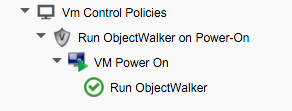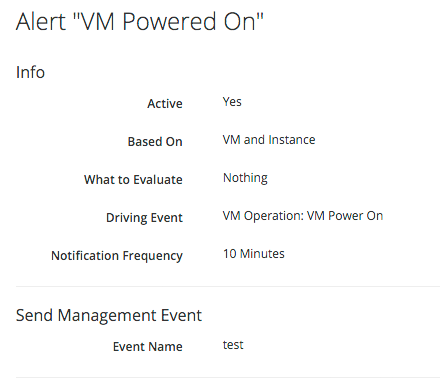Creating and Processing Internal Events
In addition to catching external events, CloudForms/ManageIQ can raise its own events that can be processed by Control Policies or Alerts. These are generated and handled by two internal (non-Automate) methods, build_evm_event and process_evm_event.
If we continue examining the processing of the RHEV USER_RUN_VM event, we see that the rel4 Relationship of the /System/Event/EmsEvent/RHEVM/USER_RUN_VM Instance initiates the creation of a generic vm_start event:
/System/event_handlers/event_action_policy? /
target=src_vm& \
policy_event=vm_start& \
param=
We find that most of the Provider-specific events (such as USER_RUN_VM for RHEV or compute.instance.power_off.end for OpenStack) are re-raised as their generic equivalent event (such as vm_start).
We can follow the processing from this point by examining evm.log.
<AutomationEngine> Invoking [builtin] method [/ManageIQ/System/event_handlers/event_action_policy] \
with inputs [{"target"=>"src_vm", "policy_event"=>"vm_start", "param"=>""}]
We see the build_evm_event method assemble the parameters for the creation of the new vm_start event:
<AutomationEngine> MiqAeEvent.build_evm_event >> event=<"vm_start">
inputs=<{:"manageiq::providers::redhat::inframanager::vm"=>
#<ManageIQ::Providers::Redhat::InfraManager::Vm
id: 1000000000023,
...>,
:ext_management_systems=>
#<ManageIQ::Providers::Redhat::InfraManager
id: 1000000000001,
...>,
:ems_event=>
#<EmsEvent
id: 1000000007999,
event_type: "USER_RUN_VM",
message: "VM rhel7srv010 started on Host rhelh03.bit63.net",
...>,
"MiqEvent::miq_event"=>1000000008000,
:miq_event_id=>1000000008000,
"EventStream::event_stream"=>1000000008000,
:event_stream_id=>1000000008000}>
The new event is queued for processing by the Automation Engine (much of the work of the Automate Engine involves queueing and de-queuing further Automate work tasks):
MIQ(MiqAeEngine.deliver) Delivering {:event_type=>"vm_start",
:"manageiq::providers::redhat::inframanager::vm"=>
#<ManageIQ::Providers::Redhat::InfraManager::Vm
...
:event_stream_id=>1000000008000} for object \
[ManageIQ::Providers::Redhat::InfraManager::Vm.1000000000023] \
with state [] to Automate
The Automation Engine de-queues the task, and instantiates the /System/Process/Event entry point into the Event Switchboard, along with the arguments assembled and passed by the build_evm_event Method:
<AutomationEngine> Instantiating [/System/Process/Event?
EventStream%3A%3Aevent_stream=1000000008000&
MiqEvent%3A%3Amiq_event=1000000008000&
MiqServer%3A%3Amiq_server=1000000000001&
User%3A%3Auser=1000000000001&
VmOrTemplate%3A%3Avm=1000000000023&
ems_event=1000000007999&
event_stream_id=1000000008000&
event_type=vm_start&
ext_management_systems=1000000000001&
manageiq%3A%3Aproviders%3A%3Aredhat%3A%3Ainframanager%3A%3Avm=1000000000023&
miq_event_id=1000000008000&
object_name=Event&
vmdb_object_type=vm]
The Event Switchboard directs the processing to the /System/Event/MiqEvent/POLICY/vm_start Instance, which does not exist by default (we could create one if we wish). The /System/Event/MiqEvent/POLICY/.missing Instance is run in its place:
<AutomationEngine> Following Relationship [miqaedb:/System/Event/MiqEvent/POLICY/vm_start#create]
<AutomationEngine> Instance [/ManageIQ/System/Event/MiqEvent/POLICY/vm_start] \
not found in MiqAeDatastore - trying [.missing]
The .missing Instance contains a rel2 Relationship to /System/event_handlers/event_enforce_policy:

<AutomationEngine> Invoking [builtin] method [/ManageIQ/System/event_handlers/ \
event_enforce_policy] with inputs [{}]
The event_enforce_policy Method initiates the processing of any Control Policies and Alerts that may be associated with the event being handled.
Event-Initiated Control Policy Processing
The /System/event_handlers/event_enforce_policy method calls process_evm_event with a target argument corresponding to the VM object that raised the event:
MIQ(MiqEvent#process_evm_event) \
target = [#<ManageIQ::Providers::Redhat::InfraManager::Vm id: 1000000000023, ...>]
The process_evm_event method raises the vm_start (VM Power On) Policy Event, and processes any actions (i.e. Control Policies) associated with the triggering of this Policy Event:
MIQ(MiqEvent#process_evm_event) Event Raised [vm_start]
In our case we have a VM Control Policy that runs an Invoke a Custom Automation action when the VM Power On Event is triggered. The Custom Automation Instance runs /Stuff/Methods/ObjectWalker (via /System/Request/Call_Instance):

The Automation Request to run Call_Instance is queued for processing by the Automation Engine. This is subsequently de-queued and delivered to Automate:
MIQ(MiqAeEngine.deliver) Delivering {"namespace"=>"stuff",
"class"=>"methods",
"instance"=>"objectwalker",
:request=>"call_instance",
"MiqPolicy::miq_policy"=>1000000000001} \
for object [VmOrTemplate.1000000000023] with state [] to Automate
Alert Processing
The process_evm_event method now raises the vm_start (VM Operation: VM Power On) Alert, and processes any actions associated with the triggering of this Alert:
MIQ(MiqEvent#process_evm_event) Alert for Event [vm_start]
In our case we have an Alert that sends a Management Event called test when the VM Operation: VM Power On Alert is triggered:

MIQ(MiqAlert.evaluate_alerts) [vm_start] Target: \
ManageIQ::Providers::Redhat::InfraManager::Vm Name: [rhel7srv010], \
Id: [1000000000023] Queuing evaluation of Alert: [VM Powered On]
Event-Initiated Automation Request Workflows
Automation Engine workflows that involve a separated Requests and Tasks also uses raised events to control the processing sequence:
MIQ(MiqProvisionRequest.call_automate_event) Raising event [request_created] to Automate
MIQ(MiqProvisionRequest.call_automate_event) Raising event [request_approved] to Automate
MIQ(MiqProvisionRequest.call_automate_event) Raising event [request_starting] to Automate
The next section (Event-Driven Automation) takes a detailed look at this workflow for a REST-initiated Automation Request.